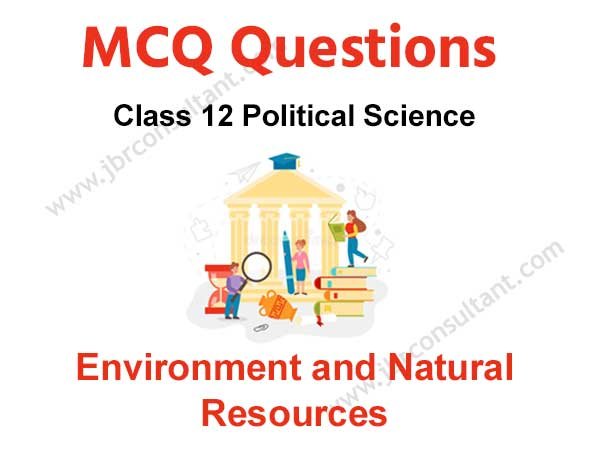Environment and Natural Resources Class 12 MCQ Questions PDF with answers is one of the best strategies to prepare for the CBSE Class 12 Board exam. If you want to complete a grasp concept or work on one’s score, there is no method except constant practice. Students can improve their speed and accuracy by doing more MCQ of Environment and Natural Resources class 12 which will help them all through their board test.
Class 12 Environment and Natural Resources MCQ Questions with Answer
Class 12 Political Science MCQ with answers are given here for Chapter 8 Environment and Natural Resources. These MCQs are based on the latest CBSE board syllabus and relate to the latest Class 12 Political Science syllabus. By Solving these Class 12 MCQs, you will be able to analyze all of the concepts quickly in the chapter and get ready for the Class 12 Annual exam.
Learn Environment and Natural ResourcesClass 12 MCQ PDF helps you to make your preparation better to score well in exams. Students should prepare for the examination by solving the CBSE MCQ of Environment and Natural Resources class 12 with answers given below.
Question 1. Sardar Sarovar Dam was built on the river:
(a) Ganga
(b) Narmada
(c) Godavari
(d) Satluj.
Answer
B
Question 2. Floods can be prevented by
(a) Afforestation
(b) Removing top soil
(c) Deforestation
(d) Agriculture
Answer
A
Question 3. Which one of the following is the best way to protect environment by individuals?
(a) By simply talking about environment
(b) By killing organisms and cutting trees
(c) By joining NGOs and involve themselves in environmental protection works
(d) By simply sitting in a home
Answer
C
Question 4. The Constitution of India provides for the safeguard of cultural and educational rights of minorities under fundamental rights of Article
(a) 20.
(b) 23.
(c) 28.
(d) 29.
Answer
D
Question 5. Animal adopt a similar state like sleep to reduce their metabolic rate, it is called:
(a) Migration
(b) Transpiration
(c) Hibernating
(d) None of these
Answer
C
Question 6. Where we can see State Department of Environment?
(a) State where there is no danger for environment
(b) State where there is danger for environment
(c) State where there is no adequate environment
(d) In all States of India
Answer
D
Question 7. The reason of soil pollution is ________________.
(a) Ozone
(b) Aerosol
(c) PAN
(d) Acid rain
Answer
D
Question 8. The green colour of plants is due to the presence of:
(a) Chlorophyll
(b) Carotene
(c) Xanthophylls
(d) All of these
Answer
A
Question 9. Which of the following is an inexhaustible natural resource?
(a) Forest
(b) Minerals
(c) Coal
(d) Water
Answer
D
Question 10. What is coliform?
(a) Group of bacteria
(b) Group of viruses
(c) Group of microoragnisms
(d) Group of diseases
Answer
A
Question 11. WWF stands for
(a) World Wild Foundation.
(b) World Wildlife Federation.
(c) World Wide Wildlife.
(d) World Wildlife Fun
Answer
D
Question 12. Main cause of extinction of species from tropics is
(a) Soil erosion.
(b) Pollution.
(c) Deforestation.
(d) Afforestation.
Answer
C
Question 13. Which is/are the abiotic components of an ecosystem?
(a) Soil
(b) Protein
(c) Carbon
(d) All of the above
Answer
D
Question 15. The World Council of Indigenous Peoples was formed in:
(a) 1973
(b) 1974
(c) 1975
(d) 1976
Answer
C
Question 16. Ecological imbalance in the biosphere in created by:
(a) Cutting of forest
(b) Conservation of forest
(c) Production of more paper
(d) Both (a) and (c)
Answer
D
Question 17. What is the purpose of rain-water harvesting?
(a) To hold rain water on the surface of the earth.
(b) To recharge ground water.
(c) To use water for the irrigation of crops.
(d) To rear fish
Answer
B
Question 18. Smog is a combination of
(a) Air and water vapours
(b) Water and smoke
(c) Fire and water
(d) Smoke and fog
Answer
D
Question 19. Management of Natural Resources Class 10 MCQ Question 1. Which one of the following is an example of renewable resource ?
(a) Coal
(b) Petroleum
(c) Wildlife
(d) Natural gas
Answer
C
Question 20. In our country, vast tracts of forests are cleared and a single species of plant is cultivate(d) This practice promotes
(a) biodiversity in the area
(b) monoculture in the area
(c) growth of natural forest
(d) preserves the natural ecosystem in the area
Answer
B
Question 21. Which of the following is the ‘biodiversity hot spots’ ?
(a) Rivers
(b) Forests
(c) Deserts
(d) Oceans
Answer
B
Question 22. Which among the following are True about the Global Commons?
(a) The earth’s atmosphere, Antarctica ocean floor and outer space are considered as part of the global commons.
(b) The global commons arc outside the sovereign jurisdiction.
(c) The question of managing the global commons reflected the North-South divide.
(d) The countries of the North are more concerned about the protection of the global common than the countries of the South.
Answer
A
Question 23. Which among the following best explains the reason for growing concerns about the environment?
(a) The developed countries are concerned about protecting nature.
(b) Protection of the environment is vital for indigenous people and natural habitats.
(c) The environmental degradation caused by human activities has become pervasive and has reached a dangerous level.
(d) None of the above.
Answer
C
Question 24. The example of global commonality is
(a) Gasoline pumps.
(b) Giant oil refineries.
(c) The ocean floor.
(d) Chain of hotels.
Answer
C
Question 25. Earth Summit was attended by:
(a) 170 states
(b) 59 states
(c) 191 states
(d) 184 states.
Answer
A
Whoever needs to take the CBSE Class 12 Board Exam should look at this MCQ. To the Students who will show up in CBSE Class 12 Political Science Board Exams, It is suggested to practice more and more questions. Aside from the sample paper you more likely had solved. Environment and Natural Resources Class 12 MCQ Questions with answers are ready by the subject specialists according to the latest CBSE and NCERT syllabus.
Question 26. The Government of India refers indigenous people as
(a) Scheduled tribes.
(b) Refugee people.
(c) Prisoners of war.
(d) Outclass people.
Answer
A
Question 27. Progress that meets the needs of the present without compromising the ability of future generations to meet their own needs is:
(a) The tragedy of global commons.
(b) Sustainable development.
(c) Development without Destruction.
(d) The politics of the developed nations.
Answer
B
Question 28. Expand UNFCCC?
(a) United Nations Framework Convention on Climate Change
(b) United Nations Framework Counter on Climate Change
(c) United Nations Framework Convention on Climate Call
(d) United Nations Fast Convention on Climate Change
Answer
A
Question 29. The multinational company Western Mining Corporation (WMC) belongs to
(a) USA
(b) Australia
(c) the UK
(d) New Zealand
Answer
B
Question 30. What was the other name for the 1987 Brundtland Report?
(a) Our Common Present
(b) Our Common Future
(c) Our Common Past
(d) None of the above
Answer
B
Question 31. The animal that is the symbol of the World Wide Wildlife Fund is:
(a) Tiger
(b) Panda
(c) Hornbill
(d) White Bear
Answer
B
Question 32. World Environment Day is celebrated each year on:
(a) 5 March
(b) 5 June
(c) 5 January
(d) 7 June
Answer
B
Question 33. The poor and developing countries of the third world are called as ___________.
(a) Global North
(b) Global East
(c) Global South
(d) Global West
Answer
C
Question 34. The United Nations Framework Convention on Climate Change was held in:
(a) 2004
(b) 1997
(c) 2001
(d) 1992.
Answer
D
Question 35. Which one of the following is metallic mineral?
(a) Gypsum
(b) Granite
(c) Rock phosphate
(d) Zinc
Answer
D
Question 36. Which gas is formed, when fossil fuels are burnt in insufficient air (oxygen)?
(a) Carbon dioxide
(b) Carbon monoxide
(c) Both CO2 and CO
(d) Neither CO2 nor CO
Answer
B
Question 37. International Ozone Day is celebrated on :
(a) December 16
(b) October 16
(c) November 16
(d) September 16
Answer
A
Question 38. Environment Day falls on
(a) 28th February
(b) 23rd March
(c) 5th June
(d) 16th August
Answer
C
Question 39. Water harvesting is a method which
(a) Increase ground water level
(b) Not practiced in modern days
(c) Has no relation with ground water
(d) Decrease ground water level
Answer
A
Question 40. The Earth Summit was held at:
(a) London
(b) New York
(c) New Delhi
(d) Rio-de-Janeiro
Answer
D
Question 41. Which of the following is the age old concept of water harvesting system in Madhya Pradesh ?
(a) Bundhis
(b) Ponds
(c) Bandharas
(d) Nadis
Answer
A
Question 42. According to Kyoto Protocol, the major nations abide to reduce concentration of green house gases was by
(a) 2008.
(b) 2010.
(c) 2012.
(d) 2018.
Answer
C
Question 43. Arabari project was started in 1972 in:
(a) Bihar
(b) Maharashtra
(c) MP.
(d) West Bengal
Answer
D
Question 44. Which statement is wrong?
(a) Forests provide variety of products
(b) Forests have greater diversity of plants
(c) Forests do not conserve soil
(d) Forests conserve water
Answer
C
Question 45. Natural Forests –
(a) help stabilize the climate
(b) moderate water supplies
(c) harbour a majority of the planet‟s bio diversity on the Land
(d) All of the above
Answer
D
Question 46. India signed and ratified the 1997 Kyoto Protocol in:
(a) August 2002
(b) July 2006
(c) August 2000
(d) August 2005
Answer
A
Question 47. The World Council of Indigenous people was formed in –
(a) 1975
(b) 1976
(c) 1986
(d) 1988
Answer
A
Question 48. India signed and ratified the 1997 Kyoto protocol in –
(a) June 2002
(b) August 2002
(c) September 2002
(d) February 2004
Answer
B
Question 49. Depletion of the amount of ozone poses a real danger to –
(a) Ecosystems
(b) human health
(c) Ecosystems and human health
(d) none of the above
Answer
C
Question 50. The earth summit was held in –
(a) May 1991
(b) June1991
(c) May 1992
(d) June 1992
Answer
D

You can easily get good marks If you study with the help of Environment and Natural Resources Class 12 MCQ Questions PDF. We trust that information provided is useful for you. NCERT Environment and Natural Resources Class 12 MCQ Questions with answers Download would without a doubt create positive results.
We hope the information shared above in regards to MCQ of Environment and Natural Resources class 12 has been helpful to you. if you have any questions regarding CBSE Class 12 Environment and Natural Resources MCQ Pdf, write a comment below and we will get back to you as soon as possible.
Frequently Asked Question (FAQs)
How many MCQ questions are there in Class 12 Political Science Chapter 8?
In Class 12 Political Science Chapter 8, we have provided 50 Important MCQ Questions, But in the future, we will add more MCQs so that you can get good marks in the Class 12 exam.
Can we score good marks in Class 12 Political Science with the help of Environment and Natural Resources MCQ Questions?
Yes, MCQ Question is one of the best strategies to make your preparation better for the CBSE Board Exam. It also helps to know the student’s basic understanding of each chapter. So, You can score good marks in Class 12 Political Science exam.


